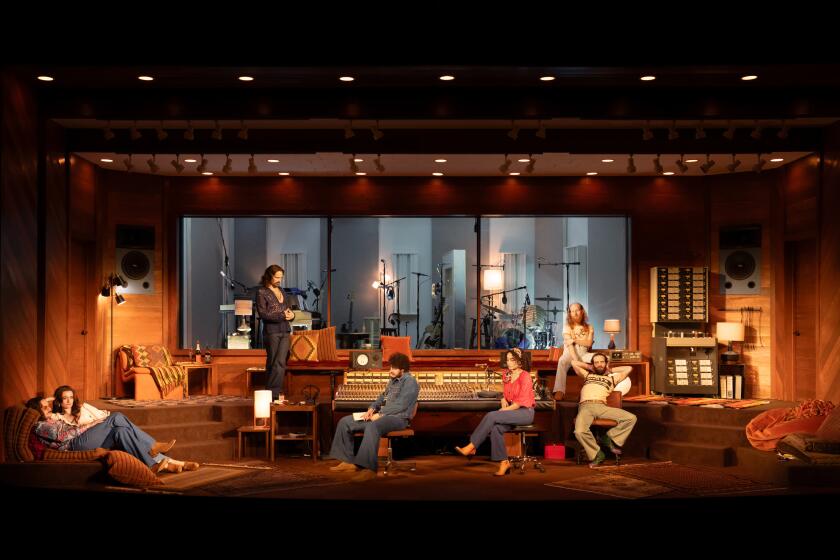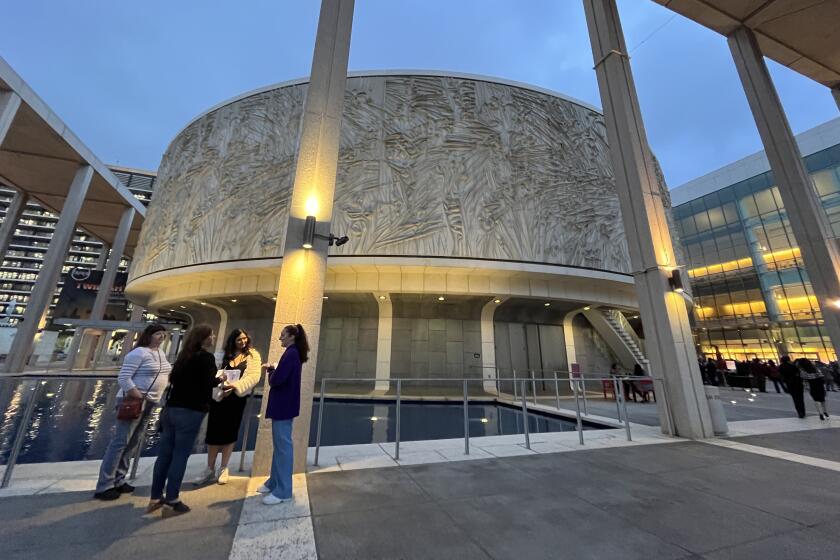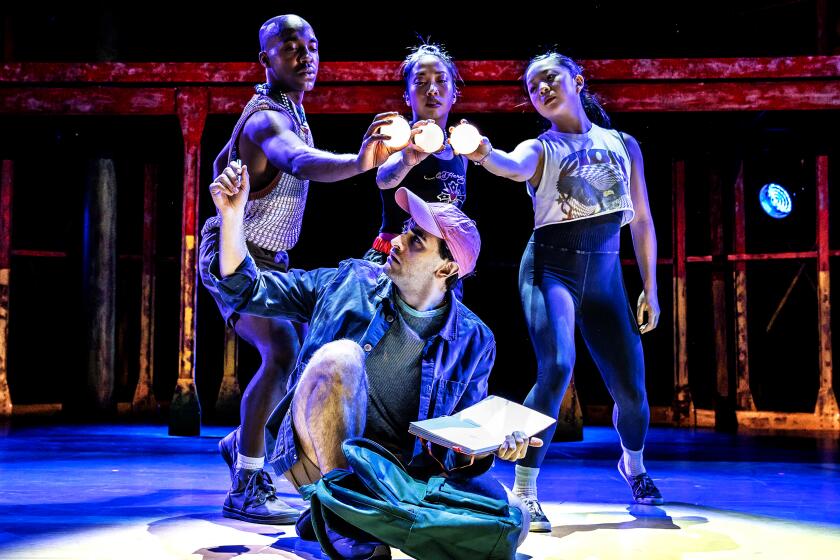Tony nominations reflect a Broadway year in which long shots eclipsed safe bets
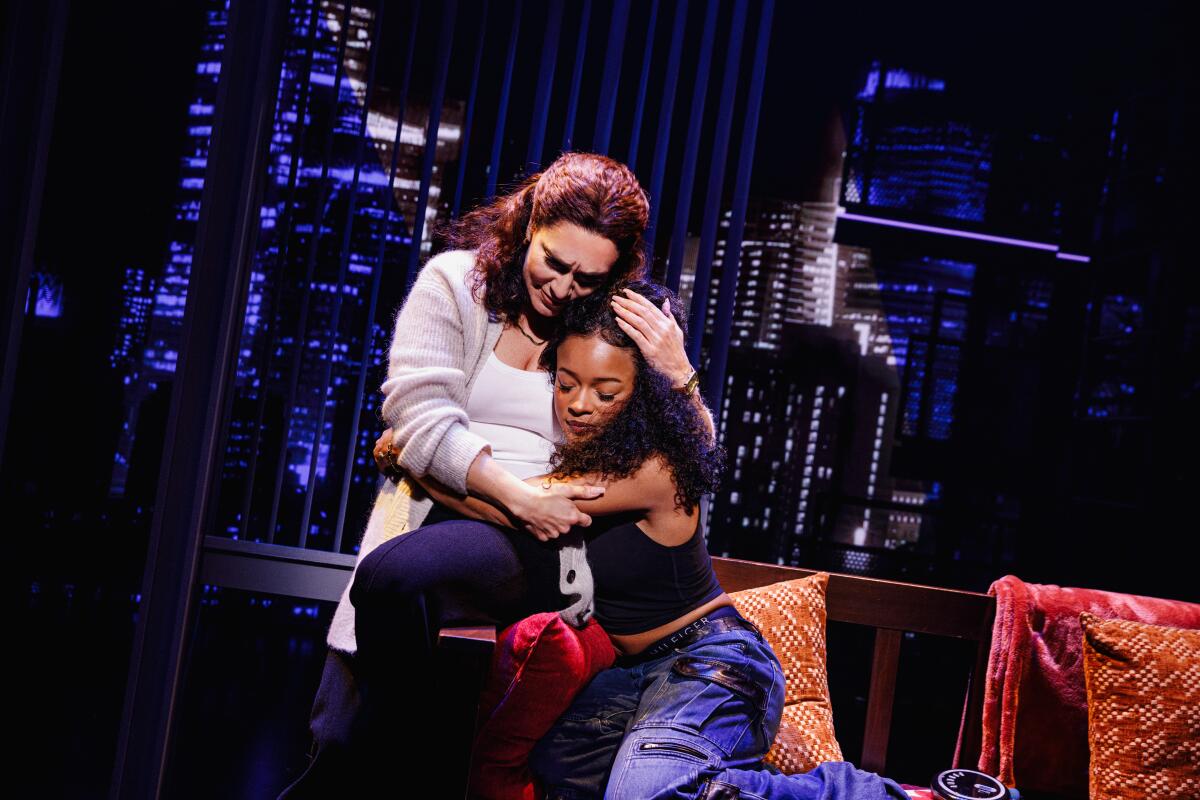
- Share via
“Nobody knows anything.”
William Goldman’s refrain in “Adventures in the Screen Trade,” his classic dissection of the movie business, has always held true for Broadway, but never more so than in a season in which long shots overshadowed safe bets.
The Tony nominations, announced in New York on Tuesday morning, paint a portrait of another year of transition on Broadway. Artistic frustration with the status quo continues to bump up against unyielding economic realities. Yet the old producing playbooks no longer reap dependable harvests.
Not even touted London imports, such as the Eddie Redmayne-led revival of “Cabaret,” or “Patriots,” Peter Morgan’s historical drama about the rise of Vladimir Putin, can count on Americans rolling out the red carpet. Reviews for both productions were mixed to the point that the Tony nominations for these shows (nine for “Cabaret,” one for “Patriots”) carry all the euphoria of a consolation prize.
The nominees for Broadway’s biggest prize were announced Tuesday, with “Stereophonic” and “Hell’s Kitchen” receiving 13 nods each. Here’s the full list of 2024 Tony nominations.
On paper, “Stereophonic,” a three-hour, 20-minute drama by an experimental off-Broadway playwright in a production lacking marquee names, doesn’t scream Broadway hit. Yet David Adjmi’s play is the most celebrated new work of the season, nominated for 13 Tonys and considered the heavy favorite for best play.
The shoo-in for best musical revival, “Merrily We Roll Along,” offers another tale of unlikely triumph. Stephen Sondheim and George Furth’s 1981 musical was a notorious flop when it premiered on Broadway. The experience was such a blow that Sondheim and director Hal Prince decided to take an extended break from a storied collaboration that had brought forth such landmark works as “Company,” “Follies,” “A Little Night Music,” “Pacific Overtures” and “Sweeney Todd.”
The few times I’ve seen “Merrily,” including Michael Arden’s glossy 2016 production at the Wallis Annenberg Center for the Performing Arts in Beverly Hills, I’ve come away with a sense of futility. The backwards chronology of the book, tracing the friendship of three artists from cynical middle age to the idealistic innocence of young adulthood, is part of the musical’s trickiness. But the bigger hurdle is the sour taste the characters can leave.

That queasy, curdling feeling has finally been conquered. With the perfect trio of actors in New York, director Maria Friedman found the heart and soul of “Merrily” in a revival that proves that Sondheim and Furth knew what they were doing all along. Jonathan Groff, Daniel Radcliffe and Lindsay Mendez, exuding the chemistry of best chums, were justly nominated for their work along with Friedman, who deserves a medal for pulling off what many, me included, feared might be impossible. Groff’s portrayal of Franklin, the emotional key to this revival’s success, is for me the standout performance of the year.
There has been no clear best musical front-runner, but “Hell’s Kitchen” has moved to the front of the pack with 13 nominations, the most of any musical. I fell under the spell of the show when I saw it at the Public Theater last fall. The energy of the production rivals “Hamilton,” which also began at the Public before moving to Broadway. It’s the one show I tell friends wanting an exuberant night on town to see.
The fire in “Hell’s Kitchen” emanates from the way Alicia Keys and her team reimagined her musical catalog to infuse an autobiographically inspired New York tale with the freedom of jazz. In one of the performances of the year (made even more mind-blowing when you realize it’s her Broadway debut), Maleah Joi Moon plays Ali, Keys’ surrogate, in an ensemble that’s ablaze with incredible voices and astonishing musical know-how. (Shoshana Bean, Kecia Lewis and Brandon Victor Dixon, all rapturously good, also received well-deserved nominations.)
CTG Artistic Director Snehal Desai and Managing Director Meghan Pressman lay out a tentative road map for recovery, including the reopening of one of the city’s most important stages.
“Hell’s Kitchen” reveals that even tried-and-true Broadway offerings have to update the formula. Perhaps that’s why the production, directed by the exceptionally busy Michael Greif (who received a nomination for his work here) enlisted the services of playwright Kristoffer Diaz, a 2010 Pulitzer Prize finalist for his play “The Elaborate Entrance of Chad Deity.”
“Hell’s Kitchen” wasn’t the only musical to recognize the need for a bold dramatic sensibility. Craig Lucas, an award-winning playwright drawn to musicals, took on the challenge of adapting with composer and lyricist Adam Guettel “Days of Wine and Roses,” which I saw last year off-Broadway at the Atlantic Theater Company’s Linda Gross Theater. Lucas wasn’t nominated but should have been for one of the most dramatically ambitious books since Lisa Kron’s for “Fun Home.” (Guettel’s score and the crushing performances of Brian d’Arcy James and Kelli O’Hara were thankfully remembered in a Broadway production that didn’t last as long as it should have.)
“Illinoise,” a dance-musical hybrid directed and choreographed by Justin Peck, is anything but a traditional book musical. But the production, based on Sufjan Stevens’ 2005 concept album, brought in the path-breaking dramatic imagination of Jackie Sibblies Drury, author of the Pulitzer Prize-winning drama “Fairview” and numerous other paradigm-shattering plays. The book by Drury and Peck is more of a rippling scenario than a fully elaborated plot, one reason why it probably wasn’t nominated (the production itself received four nominations overall, including best musical). But even a show as dreamlike as “Illinoise” can benefit from a playwright’s storytelling instincts.
Choreographer and director Justin Peck brings an athletic grace to a new, category-defying Broadway musical spun from a Sufjan Stevens album. The singing? It’s gorgeous
I never would have expected Adam Rapp, a prolific off-Broadway dramatist with an unconventional sensibility, to be working on a Broadway musical, but “The Outsiders,” which I reviewed at La Jolla Playhouse, sought a modern approach to S.E. Hinton’s classic young-adult novel. Rapp co-wrote the book with Justin Levine, who collaborated on the hypnotic folk score with Jamestown Revival in a production staged with bracing originality by Danya Taymor, an Obie-winning director who has worked with such playwrights as Jeremy O. Harris and Will Arbery. The combination of offbeat literary and musical styles resulted in a show with 12 nominations, the second most of any musical.
Tonys aside — and there’s far too much fixation on these awards for the health of the American theater — this fusion of plays and musicals is an encouraging sign. Rather than complain about who was left out of the nominations, I would like to applaud those producers who are thinking creatively about artistic pairings and the long-term vitality of the art form.
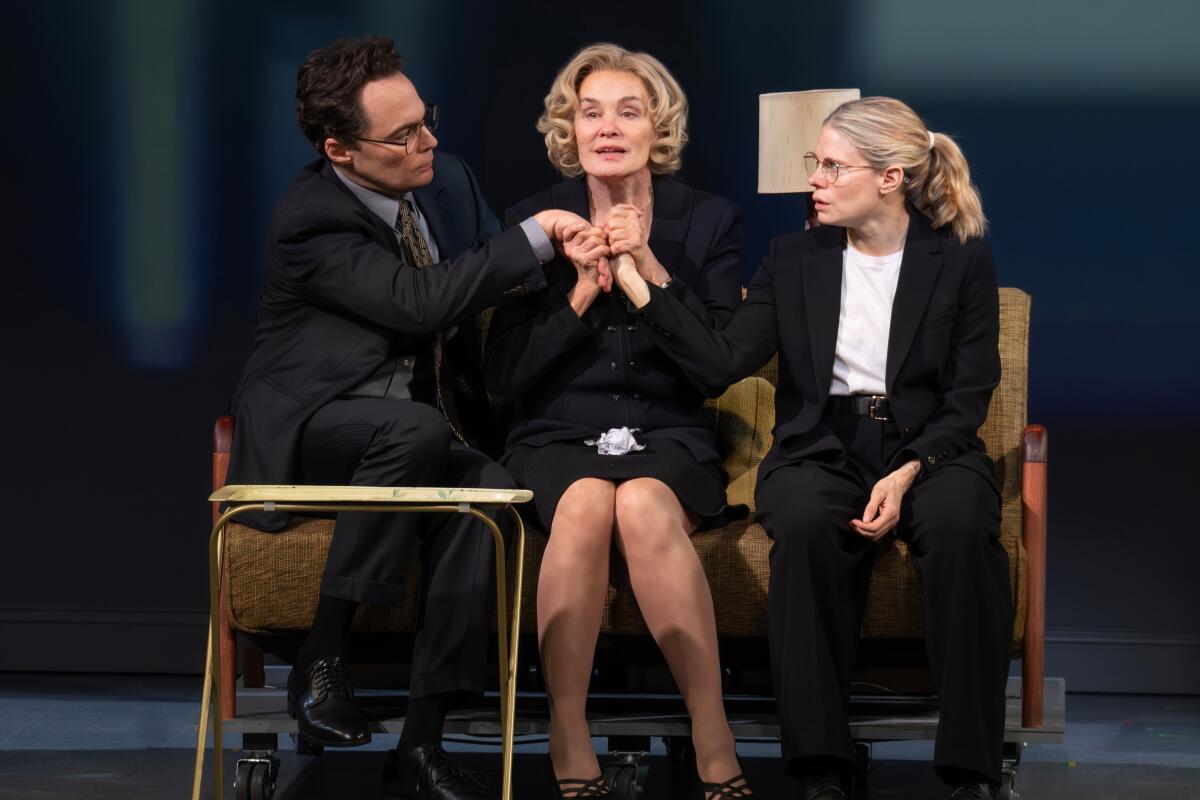
Another positive development is the way big-name Hollywood talents were put in the service of plays, classic and contemporary, too defiantly complicated to be reduced to star vehicles. Jessica Lange in Paula Vogel’s “Mother Play: A Play in Five Evictions,” Sarah Paulson in Branden Jacobs-Jenkins’ “Appropriate” and Rachel McAdams in Amy Herzog’s “Mary Jane” all were nominated for their performances in work by three of our most intrepid dramatists.
Lange, whose performance is a beautiful capstone to a stage career that has brought to life two canonical mothers, Amanda Wingfield in Tennessee Williams’ “The Glass Menagerie” and Mary Tyrone in Eugene O’Neill’s “Long Day’s Journey Into Night,” has lent her genius to the birth of a fearlessly autobiographical drama that took Vogel a lifetime to write.
Jeremy Strong and Michael Imperioli are imbuing Herzog’s Tony-nominated adaptation of Henrik Ibsen’s “An Enemy of the People” with a crackling HBO intensity. The production, directed by Sam Gold, turns the stage of Circle in the Square Theatre into a town hall, where science and politics hash out their differences in a way that speaks directly to our pandemic-scarred, climate-threatened world. Strong was nominated for his lead performance as the play’s whistle-blowing doctor.
Steve Carell might not be the first name that springs to mind when you think of Anton Chekhov, but he acquits himself well in the Lincoln Center Theater revival of “Uncle Vanya.” I was somewhat skeptical of the casting. But in an uneven revival by Lila Neugebauer (who was nominated for her direction of “Appropriate”), Carell proves that he’s more than capable of rising to the dramatic moment when his Vanya and a superb Alfred Molina in the role of the old pompous professor finally have their climactic showdown. (William Jackson Harper was the only actor nominated in an ensemble that struggled in the placeless purgatory of Neugebauer’s staging.)
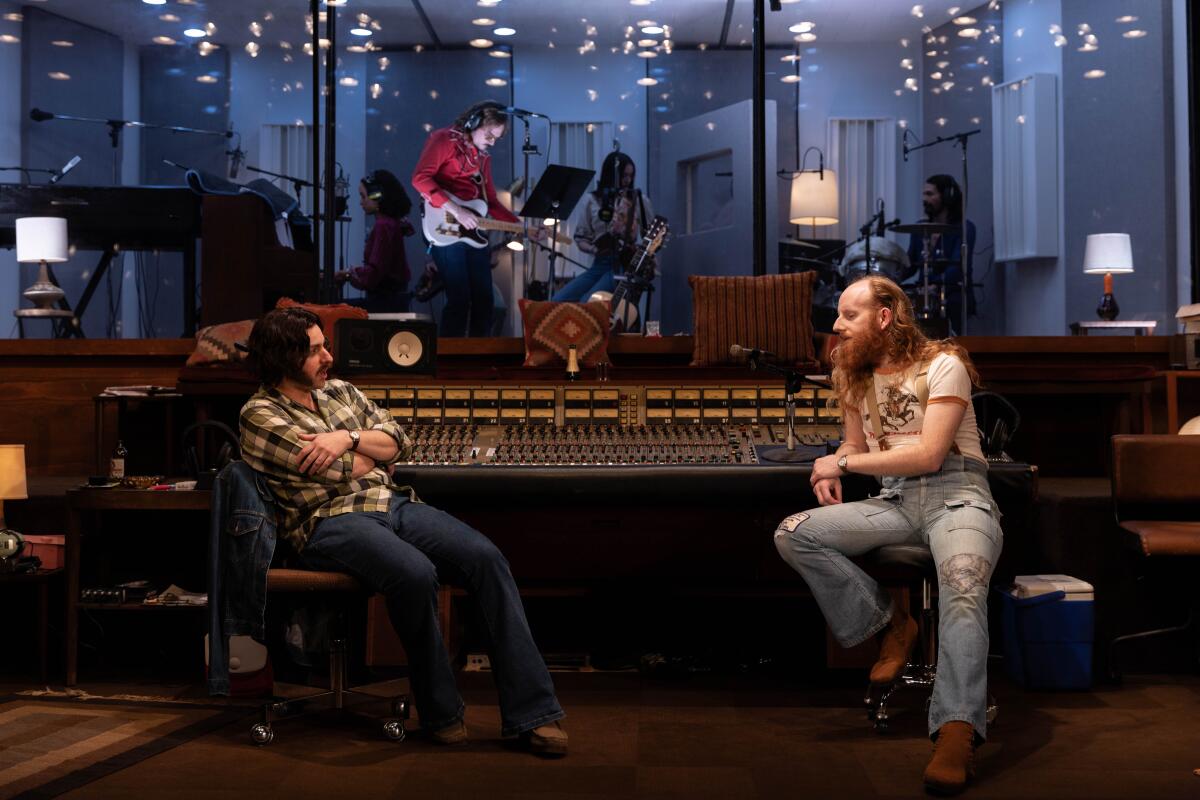
The 2023-24 Broadway season won’t go down as one for the ages. But I’m heartened by the way playwrights are being called upon to revitalize the commercial landscape with their uncompromising art. There were fears at the start of the year that there was little room for serious plays on Broadway. But as this strong showing of dramatists attest, reports of the death of the American drama on the Great White Way are premature.
One of the highlights of the year, Kenny Leon’s vibrant revival of “Purlie Victorious: A Non-Confederate Romp Through the Cotton Patch,” Ossie Davis’ 1961 satiric farce, was all the more welcome for being so unexpected and politically trenchant. And I’m glad Tony nominators didn’t forget Jocelyn Bioh’s sensationally entertaining “Jaja’s African Hair Braiding,” which I caught via livestream and hope to see soon in Los Angeles.
There are plenty of worrying signs. The traffic jam of productions all trying to open before the Tony Award deadline reflects a field that still sees these statuettes as a lifeline.
Another problem was concisely articulated in a theater website email subject line describing one of the new musicals that opened in April as “plodding” but “necessary.” I didn’t see the show so can’t comment on the accuracy of the appraisal. But such a formulation — boring but good for you — will never draw theater audiences back to their pre-pandemic levels.
Art shouldn’t be devoid of nutritional value, but delight should accompany enlightenment for maximum effect, as Horace long ago instructed. “Merrily We Roll Along,” “Stereophonic,” “Mother Play,” “Hell’s Kitchen,” “Illinoise” and “Purlie Victorious,” to list the highlights of my own theatergoing year, remind us that pleasure and complexity are mutually enhancing when traveling hand in hand.
More to Read
The biggest entertainment stories
Get our big stories about Hollywood, film, television, music, arts, culture and more right in your inbox as soon as they publish.
You may occasionally receive promotional content from the Los Angeles Times.
